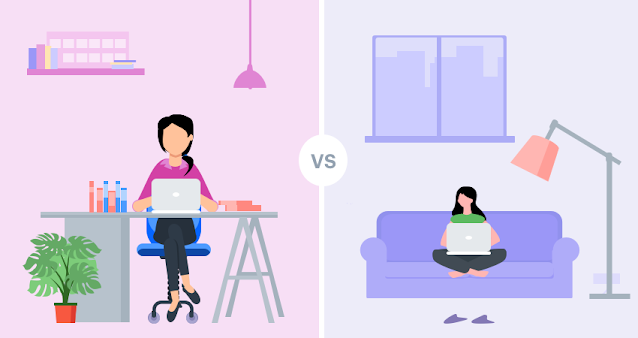Remote Work or Office which is beneficial?
With the planet discovering other ways to figure without human contact, the work from the home force is getting a facelift. Companies must deal with most non-essential workers completing their work at home. Amidst an epidemic, could your productivity performing from home actually be better?
An estimate by Upwork states that 1 in 4 Americans which is over 26% of the American workforce is predicted to figure remotely through 2021.
In 2021, 70 percent of those who worked from home during the pandemic report virtual meetings are less stressful, and 64 percent now prefer hybrid meetings consistent with a report by Owl Labs.
Several studies over the past few months show productivity while working remotely from home is better than working in an office setting. On average, those that work from home spend 10 minutes less each day being unproductive, work another day every week, and are 47% more productive.
Performance can increase up to 13 percent by working from home:
A study by Stanford of 16,000 workers over 9 months found that working from home increased productivity by 13%. This increase in performance was due to more calls per minute attributed to a quieter, more convenient working environment and working more minutes per shift because of fewer breaks and sick days.
In this same study workers also reported improved work satisfaction, and attrition rates were cut by 50%.
Pros of working from home:
- More independence.
- No commute to work.
- Save on expenses.
More independence
Working from home can provide autonomy and independence in your job that might be absent in a physical workplace. Additionally, these types of roles require self-discipline and motivation enough to manage time responsibly and complete job tasks.
No commute to work
Work-from-home jobs mean you can eliminate your commute. Even if you work from home one or two days during the week, you travel less.
Save on expenses
This benefit can have several far-reaching effects. For instance, when you eliminate commuting, you can reduce your fuel and transportation expenses. Telecommuting can also help you reduce other expenses like work clothing, meals, and even childcare. Saving on the costs of childcare can be especially advantageous to parents working from home.
Cons of working from home:
- Increased isolation.
- Home office costs.
- Risk to productivity.
Increased isolation
You can become quite isolated working from home if you spend the majority of your time by yourself, working independently. The key to avoiding loneliness and isolation as a remote worker is to schedule outings and events with friends and family. Some remote workplaces offer regular team events to encourage socialization.
Home office costs
Some remote positions require specific equipment like headsets, webcams, or software to perform essential tasks and projects. If you want to set up a desk, chair, and other furniture, you can expect to cover some initial costs to get your home office organized. Keep your costs low by spending only what you need to perform your job.
Risk to productivity
Although working from home can help increase your productivity, it can also be a challenge to it. With the freedom to move around and take breaks whenever the mood arises, it might be difficult to stay focused on the tasks you're working on. This can ultimately lead to slower productivity. One way to combat this is to implement productivity tools like time trackers and task management applications.
Working from home can be a more productive work environment than the typical office cubicle enhancing work-life balance depending on your setup. The current pandemic has changed the way we work, and more companies are turning to at-home solutions.
Make sure your employees are comfortable, organized, and healthy to also make sure their productivity stays at company standards for months to come.
As one of the leading engineering staffing agencies, we help employers recruit engineering, design, and IT Talent. Contact us about our Engineering recruiting services or IT staffing services.












0 comments:
Post a Comment